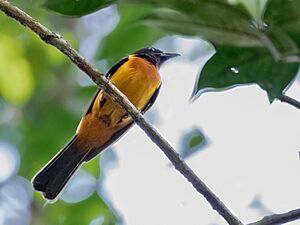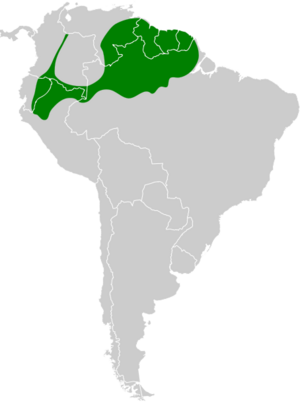Fulvous shrike-tanager facts for kids
Quick facts for kids Fulvous shrike-tanager |
|
|---|---|
 |
|
| Conservation status | |
| Scientific classification |
|
| Kingdom: | Animalia |
| Phylum: | Chordata |
| Class: | Aves |
| Order: | Passeriformes |
| Family: | Thraupidae |
| Genus: | Lanio |
| Species: |
L. fulvus
|
| Binomial name | |
| Lanio fulvus (Boddaert, 1783)
|
|
 |
|
| Script error: The function "autoWithCaption" does not exist. | |
Script error: No such module "Check for conflicting parameters".
The fulvous shrike-tanager (scientific name: Lanio fulvus) is a beautiful bird found in South America. It belongs to the tanager family, called Thraupidae. These birds are known for their bright colors and songs.
You can find the fulvous shrike-tanager in several countries, including Brazil, Colombia, Ecuador, French Guiana, Guyana, Peru, Suriname, and Venezuela. This bird loves to live in warm, wet places. Its natural habitat is in subtropical or tropical lowland forests, where there is plenty of moisture.
Contents
Understanding the Fulvous Shrike-Tanager's Name
Scientists use a special system called taxonomy to name and group all living things. This helps them organize and understand the natural world. The fulvous shrike-tanager has a unique scientific name, Lanio fulvus.
How the Bird Got Its Name
The fulvous shrike-tanager was first described in 1779 by a French scientist named Georges-Louis Leclerc, Comte de Buffon. He wrote about it in his book Histoire Naturelle des Oiseaux, based on a bird found in Cayenne, French Guiana.
Later, in 1783, a Dutch naturalist named Pieter Boddaert gave the bird its first scientific name, Tangara fulva. Over time, scientists decided to place this bird in a different group, or genus, called Lanio. This genus was created by another French bird expert, Louis Pierre Vieillot, in 1816. The fulvous shrike-tanager is the main example, or type species, for this Lanio group.
What Do the Names Mean?
The genus name Lanio comes from the word Lanius, which is the name for a group of birds called shrikes. Shrikes are known for their strong, hooked beaks.
The second part of the scientific name, fulvus, is a Latin word. It means "tawny," "brown," or "fulvous." This describes the bird's brownish-orange color. So, the name Lanio fulvus basically means "shrike-like bird that is tawny colored."
Different Types of Fulvous Shrike-Tanagers
Just like people can have different features depending on where they live, some animals have slightly different forms called subspecies. Scientists recognize two subspecies of the fulvous shrike-tanager:
- L. f. peruvianus Carriker, 1934 – This subspecies is found in western Venezuela, southern Colombia, eastern Ecuador, and northeastern Peru.
- L. f. fulvus (Boddaert, 1783) – This is the original subspecies, found in southeastern Venezuela, the Guianas (French Guiana, Guyana, Suriname), and northern Brazil.
 | Madam C. J. Walker |
 | Janet Emerson Bashen |
 | Annie Turnbo Malone |
 | Maggie L. Walker |


